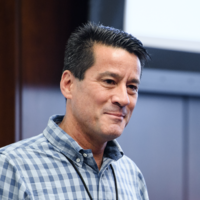Assessing the Promise of Artificial Intelligence Speakers: Difference between revisions
From Santa Fe Institute Events Wiki
No edit summary |
No edit summary |
||
| (7 intermediate revisions by the same user not shown) | |||
| Line 5: | Line 5: | ||
*[[Assessing_the_Promise_of_Artificial_Intelligence_Speakers|Speakers]] | *[[Assessing_the_Promise_of_Artificial_Intelligence_Speakers|Speakers]] | ||
*[[Assessing_the_Promise_of_Artificial_Intelligence_Registration|Registration]] | *[[Assessing_the_Promise_of_Artificial_Intelligence_Registration|Registration]] | ||
*[[ | *[[Assessing_the_Promise_of_Artificial_Intelligence_Zoom|Zoom Information]] | ||
|} | |} | ||
<br> | <br> | ||
[[Image: | [[Image:Cyborgmeld AI meaning complexity upscale.jpg|500px|border|]]<br/> | ||
<br> | <br> | ||
---- | ---- | ||
''' | '''SFI ACtioN Virtual Topical Meeting<br /> | ||
June 24 - 26, 2020<br /> | |||
Co-sponsored by ACtioN member Goldman Sachs''' | |||
---- | ---- | ||
[[File: Michael.Kearns.png|thumb|200px|[https://www.santafe.edu/people/profile/michael-kearns '''Michael Kearns''']<br/>'''University of Pennsylvania and Santa Fe Institute''']] | [[File: Michael.Kearns.png|thumb|200px|[https://www.santafe.edu/people/profile/michael-kearns '''Michael Kearns''']<br/>'''University of Pennsylvania and Santa Fe Institute''']] | ||
'''Michael Kearns''' is | '''Michael Kearns''' is a professor in the Computer and Information Science department at the University of Pennsylvania, where he also has appointments in the Economics department and Wharton School, and External Professor at the Santa Fe Institute. He is founder and co-director of Penn’s Warren Center for Network and Data Sciences, and he is Senior Advisor in Morgan Stanley’s Center of Excellence for Machine Learning and AI. Kearns has long experience as a quant on Wall Street and as a consultant in the technology industry. His research interests are in machine learning, algorithmic game theory and quantitative trading. Kearns and his Penn colleague Aaron Roth are co-authors of the general-audience book [https://global.oup.com/academic/product/the-ethical-algorithm-9780190948207?cc=us&lang=en& ''The Ethical Algorithm: The Science of Socially Aware Algorithm Design''] (Oxford University Press, 2019). | ||
<div style="clear: both;"></div> | <div style="clear: both;"></div> | ||
<hr/> | <hr/> | ||
[[File: Mitchell.jpg|thumb|200px|[https://www.santafe.edu/people/profile/melanie-mitchell '''Melanie Mitchell''']<br/>'''Santa Fe Institute and Portland State University''']] | [[File: Mitchell.jpg|thumb|200px|[https://www.santafe.edu/people/profile/melanie-mitchell '''Melanie Mitchell''']<br/>'''Santa Fe Institute and Portland State University''']] | ||
'''Melanie Mitchell''' is the Davis Professor of Complexity at the Santa Fe Institute, and Professor of Computer Science (currently on leave) at Portland State University. Her current research focuses on conceptual abstraction, analogy-making, and visual recognition in artificial intelligence systems.<br/><br/>Melanie is the author or editor of six books and numerous scholarly papers in the fields of artificial intelligence, cognitive science, and complex systems. Her book ''[http://www.amazon.com/Complexity-Guided-Tour-Melanie-Mitchell/dp/0199798109/ref=tmm_pap_title_0 Complexity: A Guided Tour]'' (Oxford University Press) won the 2010 Phi Beta Kappa Science Book Award and was named by Amazon.com as one of the ten best science books of 2009. Her latest book is ''[https://melaniemitchell.me/aibook/ Artificial Intelligence: A Guide for Thinking Humans]'' (Farrar, Straus, and Giroux).<br/><br/>Melanie originated the Santa Fe Institute's Complexity Explorer platform, which offers online courses and other educational resources related to the field of complex systems. Her online course “Introduction to Complexity” has been taken by over 25,000 students, and is one of Course Central’s “top fifty online courses of all time”. | '''Melanie Mitchell''' is the Davis Professor of Complexity at the Santa Fe Institute, and Professor of Computer Science (currently on leave) at Portland State University. Her current research focuses on conceptual abstraction, analogy-making, and visual recognition in artificial intelligence systems.<br/><br/>Melanie is the author or editor of six books and numerous scholarly papers in the fields of artificial intelligence, cognitive science, and complex systems. Her book ''[http://www.amazon.com/Complexity-Guided-Tour-Melanie-Mitchell/dp/0199798109/ref=tmm_pap_title_0 Complexity: A Guided Tour]'' (Oxford University Press) won the 2010 Phi Beta Kappa Science Book Award and was named by Amazon.com as one of the ten best science books of 2009. Her latest book is ''[https://melaniemitchell.me/aibook/ Artificial Intelligence: A Guide for Thinking Humans]'' (Farrar, Straus, and Giroux).<br/><br/>Melanie originated the Santa Fe Institute's [https://www.complexityexplorer.org/ Complexity Explorer] platform, which offers online courses and other educational resources related to the field of complex systems. Her online course “Introduction to Complexity” has been taken by over 25,000 students, and is one of Course Central’s “top fifty online courses of all time”. | ||
<div style="clear: both;"></div> | <div style="clear: both;"></div> | ||
<hr/> | <hr/> | ||
[[File: MikePrice.png|thumb|200px|[https://www.santafe.edu/people/profile/mike-price '''Mike Price''']<br/>'''Santa Fe Institute''']] | [[File: MikePrice.png|thumb|200px|[https://www.santafe.edu/people/profile/mike-price '''Mike Price''']<br/>'''Santa Fe Institute''']] | ||
'''Mike Price''' is an Applied Complexity Fellow at the Santa Fe Institute. Mike earned his Ph.D. in Anthropology from Stanford University and was a | '''Mike Price''' is an Applied Complexity Fellow at the Santa Fe Institute. Mike earned his Ph.D. in Anthropology from Stanford University and was a Postdoctoral Researcher at Pennsylvania State University. Prior to that he earned a B.S. in Physics from Harvey Mudd College and has spent time working as an engineer at Raytheon Space and Airborne Systems. Mike also served as an SFI-ASU Postdoctoral Fellow from 2017 to 2019. Mike is interested in economic decision making in the broadest sense. This includes both conventional economic decisions, such as which toothpaste to buy or whether to borrow money to purchase a house, and less conventional economic decisions, such as whether to hunt for monitor lizards or kangaroos as a forager in Australia’s Western Desert or whether to allocate scarce resources to current or future reproduction.<br/><Br/>He is currently exploring how evolutionary theory can be linked with economic theory to better understand human decision making. He hopes that this may lend insight into recent experimental work in behavioral economics that has uncovered systematic deviations between the predictions of standard economic models of rational choice and observed behavior. | ||
<div style="clear: both;"></div> | <div style="clear: both;"></div> | ||
<hr/> | <hr/> | ||
Latest revision as of 15:44, 1 May 2020
SFI ACtioN Virtual Topical Meeting
June 24 - 26, 2020
Co-sponsored by ACtioN member Goldman Sachs

University of Pennsylvania and Santa Fe Institute
Michael Kearns is a professor in the Computer and Information Science department at the University of Pennsylvania, where he also has appointments in the Economics department and Wharton School, and External Professor at the Santa Fe Institute. He is founder and co-director of Penn’s Warren Center for Network and Data Sciences, and he is Senior Advisor in Morgan Stanley’s Center of Excellence for Machine Learning and AI. Kearns has long experience as a quant on Wall Street and as a consultant in the technology industry. His research interests are in machine learning, algorithmic game theory and quantitative trading. Kearns and his Penn colleague Aaron Roth are co-authors of the general-audience book The Ethical Algorithm: The Science of Socially Aware Algorithm Design (Oxford University Press, 2019).

Santa Fe Institute and Portland State University
Melanie Mitchell is the Davis Professor of Complexity at the Santa Fe Institute, and Professor of Computer Science (currently on leave) at Portland State University. Her current research focuses on conceptual abstraction, analogy-making, and visual recognition in artificial intelligence systems.
Melanie is the author or editor of six books and numerous scholarly papers in the fields of artificial intelligence, cognitive science, and complex systems. Her book Complexity: A Guided Tour (Oxford University Press) won the 2010 Phi Beta Kappa Science Book Award and was named by Amazon.com as one of the ten best science books of 2009. Her latest book is Artificial Intelligence: A Guide for Thinking Humans (Farrar, Straus, and Giroux).
Melanie originated the Santa Fe Institute's Complexity Explorer platform, which offers online courses and other educational resources related to the field of complex systems. Her online course “Introduction to Complexity” has been taken by over 25,000 students, and is one of Course Central’s “top fifty online courses of all time”.

Santa Fe Institute
Mike Price is an Applied Complexity Fellow at the Santa Fe Institute. Mike earned his Ph.D. in Anthropology from Stanford University and was a Postdoctoral Researcher at Pennsylvania State University. Prior to that he earned a B.S. in Physics from Harvey Mudd College and has spent time working as an engineer at Raytheon Space and Airborne Systems. Mike also served as an SFI-ASU Postdoctoral Fellow from 2017 to 2019. Mike is interested in economic decision making in the broadest sense. This includes both conventional economic decisions, such as which toothpaste to buy or whether to borrow money to purchase a house, and less conventional economic decisions, such as whether to hunt for monitor lizards or kangaroos as a forager in Australia’s Western Desert or whether to allocate scarce resources to current or future reproduction.
He is currently exploring how evolutionary theory can be linked with economic theory to better understand human decision making. He hopes that this may lend insight into recent experimental work in behavioral economics that has uncovered systematic deviations between the predictions of standard economic models of rational choice and observed behavior.

